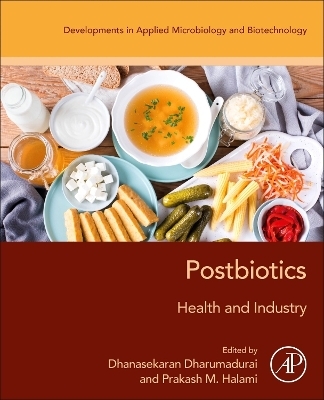
Postbiotics
Academic Press Inc (Verlag)
978-0-443-22188-0 (ISBN)
- Noch nicht erschienen (ca. Oktober 2024)
- Versandkostenfrei innerhalb Deutschlands
- Auch auf Rechnung
- Verfügbarkeit in der Filiale vor Ort prüfen
- Artikel merken
Dr. Dharumadurai Dhanasekaran is a Professor in the Department of Microbiology, Principal Investigator in National Repository for Microalgae and Cyanobacteria—Freshwater (NRMC-F) at Bharathidasan University in Tiruchirappalli, India. His research experience is in the fields of actinobacteriology and mycology. His current research focuses on probiotic microorganisms and postbiotics and microbiome profiling in plant and animal system. He has been awarded an UGC-Raman Post-Doctoral Fellowship and has worked in the Department of Molecular, Cellular, and Biomedical Sciences at the University of New Hampshire in Durham, USA. He studied the genome properties of probiotic bacteria by whole genome, metagenome sequencing, and formulated probiotic feed supplements for dairy cow. He edited 17 books with international publishers and served as a reviewer, guest editor, and on the editorial boards of national and international journals. Dr. Prakash M. Halami is a Chief Scientist in Microbiology and Fermentation Technology at CSIR-Central Food Technological Research Institute in Mysore, India. He has a postgraduate degree in Molecular Biology and Biotechnology from the National Centre for Plant Biotechnology, PUSA Institute, IARI in New Delhi, and a doctorate in Biotechnology from the University of Mysore. Dr. Halami also has advanced training in Biotechnology from Kobe University in Japan, conducted doctoral degree research at the University of Frankfurt in Germany, and postdoctoral research at the University of Minnesota, USA, as a Raman Research Fellow. His laboratory investigates the mechanism of food-grade metabolite production by microorganisms using classical microbiology approaches and by using genomic tools, and his research activities include the characterization and transferability of antibiotic resistance genes in probiotic bacteria, development of defined starter cultures, and molecular taxonomy. He also has nearly three decades of R & D experience.
I. Fundamentals of Postbiotics
1. Postbiotics and Host Microbe Interactions
2. Insights into Probiotics Microorganisms
3. Postbiotics from Lactobacillus sp
4. Postbiotics from Bifidobacterium sp
5. Postbiotics from Lactococcus sp
6. Postbiotic from Saccahomyces sp
7. Postbiotics from non-LAB microbes Akkermansia
8. Postbiotics from non-LAB microbes Bacillus
9. Analysis of Postbiotic Metabolites from Probiotic Microbes
10. Analysis of Postbiotics from Fermented Dairy Food
11. Analysis of Postbiotics from non-dairy fermented food
12. Separation, Characterization, and Identification of Postbiotics from Probiotic Microbes
13. Methods Of Postbiotic Preparations and Optimization
14. Next Generation Sequence Analysis of Postbiotics in Fermented Food
15. Next Generation Probiotics as Sources of Postbiotics
16. Genomic characterization of Postbiotics
17. Nutritional Features and Safety of Postbiotics
18. Delivery and Dose Form of Postbiotics
19. Challenges and Limitations of Postbiotics
II. Postbiotics Types and Mechanisms
20. Exopolysaccharides as Postbiotics
21. Short Chain Fatty Acids as Postbiotics
22. Biosurfactants As Postbiotics
23. Enzymes And Vitamins from Probiont as Postbiotics
24. Microbial Peptides as Postbiotics
25. Bacterial Lysate and Techoic Acid as Postbiotics
26. Mechanisms of Postbiotics Action
27. Commercially Available Human and Animal Postbiotics
28. Postbiotic Effects on Drug Metabolism and Therapeutic Outcomes
29. Postbiotics Metabolisms in a Dysbiotic Human Gut
30. Meta-Analysis of Postbiotics
III. Applications of Postbiotics in Health and Pharmaceutical Industry
31. Postbiotics: A Health Promoters in Human and Animals
32. Multi-Omics to Understand the Effect of Postbiotics on Human Physiology
33. Meta-Analysis for the Use of Post Biotics for Pre-Clinical and Clinical Trials
34. Antimicrobial Effects of Postbiotics
35. Prevention of Microbial Infections by Postbiotic Metabolites
36. Prevention of Food Allergies Using Postbiotics
37. Anticancer And Antioxidant Activity of Postbiotics
38. Antioxidant Activity of Postbiotics
39. Anti-Inflammatory Effects of Postbiotics
40. Anti-Atherosclerotic Effects of Postbiotics
IV. Applications of Postbiotics in Non-Human Host
41. Postbiotic Metabolites in Livestock Feeding
42. Postbiotics Metabolites in Aquaculture
43. Growth And Immunomodulatory Postbiotic Effects in Fish
44. Growth And Immunomodulatory Postbiotic Effects in Shrimp
45. Growth And Immunomodulatory Postbiotic Effects in Poultry
46. Growth And Immunomodulatory Postbiotic Effects in Pigs
47. Growth And Immunomodulatory Postbiotic Effects in Mice
V. Applications of Postbiotics in Food Industry
48. Biopreservation of meat and fish products using Postbiotics
49. Biopreservation of Dairy Products Using Postbiotics
50. Biopreservation of Vegetables and Fruits Using Postbiotics
51. Bacteriocin: Novel Ingredients as Food Biopreservatives
52. Postbiotics Food Packing Based on Organic Acids and Peptides
53. Postbiotics Food Packing Using Bacteriocin
54. Antibiofilm Activity of Postbiotics
55. Degradation of Bisphenol a Using Postbiotics
56. Biodegradation of Pesticides Using Postbiotics
57. Biodegradation of Mycotoxins Using Postbiotics
58. New Product Developments from Postbiotics
59. Preservation of Postbiotics
| Erscheint lt. Verlag | 18.10.2024 |
|---|---|
| Reihe/Serie | Developments in Applied Microbiology and Biotechnology |
| Verlagsort | San Diego |
| Sprache | englisch |
| Maße | 191 x 235 mm |
| Gewicht | 450 g |
| Themenwelt | Naturwissenschaften ► Biologie ► Mikrobiologie / Immunologie |
| Technik ► Umwelttechnik / Biotechnologie | |
| ISBN-10 | 0-443-22188-X / 044322188X |
| ISBN-13 | 978-0-443-22188-0 / 9780443221880 |
| Zustand | Neuware |
| Haben Sie eine Frage zum Produkt? |
aus dem Bereich


